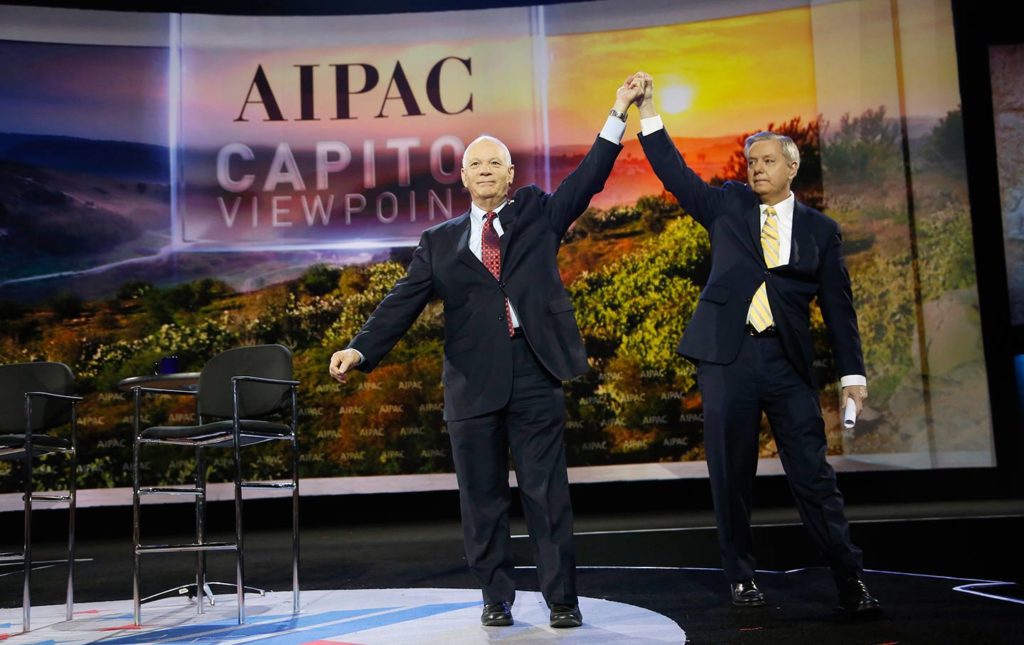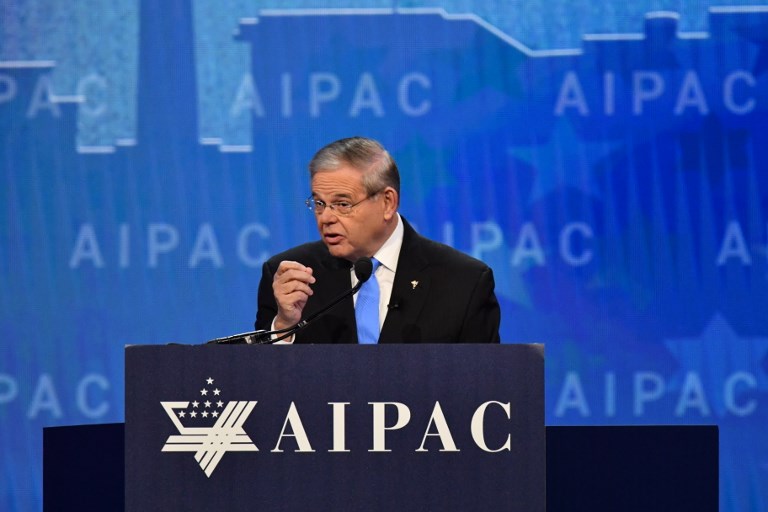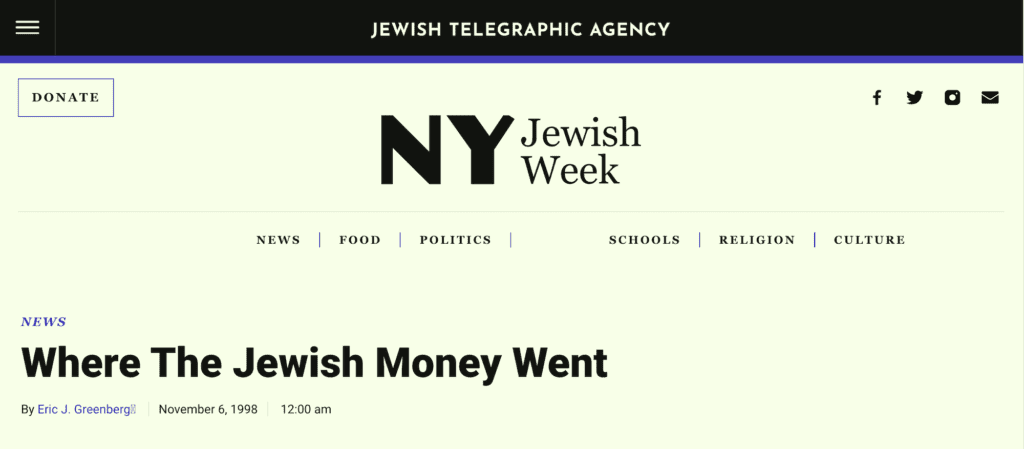A detailed report on how The Jews have worked to oppose a distinguished nominee from becoming Ambassador to Brazil because of comments she had made over two decades ago about the Jewish lobby…
The Jews have combined to oppose a distinguished nominee from becoming Ambassador to Brazil because of comments she had made over two decades ago about the lobby for Israel
Democratic Senators Cardin and Menendez initiated the attack on longtime diplomat and Democratic donor Elizabeth Frawley Bagley, then Republicans finished it off…
The full Senate could theoretically still confirm Bagley to the important post, but either way, the message has been delivered: Don’t mention facts about the Israel lobby that its members dislike, or they’ll mobilize their ‘nonexistent’ power against you…
By Alison Weir: On May 18th the Senate Foreign Relations committee held a hearing on the latest ambassadorial nominations. These were for the U.S. diplomatic representatives to Brazil, Panama, Belize, and the Organization of American States. (Video here and transcript available here)
One might think this hearing would have nothing to do with Israel. One would be wrong.
While virtually all the committee’s questions for the nominees concerned the countries to which they’d be posted, there was one exception.
Democratic Senator Ben Cardin (MD) said he was concerned by some comments the potential Ambassador to Brazil, Elizabeth Frawley Bagley, had made about Israel during an oral history interview 24 years before. Cardin is a fervent Israel advocate despite its long record of human rights abuses & harm to the U.S.
Committee Chairman Robert Menendez (NJ), also a Democrat and (well-rewarded) Israel partisan as well as a member of the powerful Cuban lobby, chimed in, grilling Bagley on some of her statements about Israel and Cuba, while singing the praises of Israel.


Since Cardin and Menendez took Bagley’s oral history comments out of context (as did most of the media coverage), it’s important to look at the 1998 interview itself.
The interview was conducted for The Association for Diplomatic Studies and Training Foreign Affairs Oral History Project. The interviewer was Charles Stuart Kennedy, who had initiated the project in 1985, interviewing over a thousand American diplomats for the project. Kennedy was an author and a retired Foreign Service Officer himself who had been awarded the Foreign Service Cup in 1997.
Kennedy’s interview of Bagley was probing, conversational, and wide-ranging. During it, Bagley talked candidly on a multitude of topics: about her Irish-American childhood, her parents, schools, and philanthropy. She also discussed in detail her multifaceted career, including activism with the Democratic Party, work for various political campaigns, and her 20 years of experiences in the State Department, such as her work connected with the Panama Canal treaties and Camp David Accords. The interview transcript is 46,000 words long and takes up 86 pages.
It’s unclear what triggered Cardin and Menendez’s sudden concern about the 1998 interview, since Bagley has had a long and distinguished career in the over two decades since, including unanimous approval by the Senate for at least one previous position. She has also been a major campaign donor to Democrats, funding the party itself and a multitude of candidates, many of them Israel partisans – including Menendez himself.
During the years since the oral history interview, Bagley has served as Senior Adviser to Secretary of State Madeleine Albright (1997 -2001); Special Representative for Global Partnerships (2009 – 2010); Senior Adviser to Secretary of State Hillary Clinton (2010 – 2013) and Secretary of State John Kerry (2013 – 2017); and Special Representative to the United Nations General Assembly, appointed by President Obama in 2011- approved unanimously by the Senate. In 2013 she was awarded the Secretary of State’s Distinguished Honor Award. Bagley was previously Ambassador to Portugal and speaks Portuguese, French, and Spanish. She attended university and law school in France, Spain, and Austria, where she studied international trade law and public international law.
In Cardin’s interrogation of Bagley none of this is mentioned, and there are no questions about her knowledge and views about Brazil, even though Brazil is of considerable strategic importance to the U.S. Instead, Cardin launches into questions about a few of her comments in the oral history interview, although he gets the year wrong, and it’s unclear whether he has read the whole interview or has just been fed excerpts.
Cardin tells Bagley he is concerned about the language she used “in regards to the Jewish community, Israel’s influence in our election, and jewish money.” Her words, he says, “fit into the traditional tropes of anti-semitism,” and he complains that her language should have been “more guarded.”
Bagley’s allegedly offensive comments had been part of a section of the interview in which Bagley had discussed special interest lobbying extensively and honestly, the problem of money in politics, her law school paper on campaign finance reform, and the danger of soft money. She had stated: “I did a lot of research on it in 1984-85, and it was already starting to be an issue, and now it is a huge issue because there is too much money out there and the system is in danger of being corrupted; certainly many abuse it now.”
Bagley’s answers to Kennedy’s questions, which likely reflected the knowledge he had gleaned from interviewing hundreds of diplomats before her, were certainly unguarded – and provide an unusually frank and interesting ‘insider baseball’ window into events.
Below is the section of the interview from which her truncated comments were taken:
KENNEDY: I would think one of the big things of any campaign would be the Israeli influence. How did that play? Someone from Arkansas is not going to come out with a lot of commitment on the Israeli side.
BAGLEY: Yes, there aren’t very many Jews in Arkansas or in Tennessee. Both of them were national figures in terms of having been involved nationally. Al Gore having run before and getting himself in trouble in New York during the primary in 1988. There always the influence of the Jewish lobby because there is major money involved. But, I don’t remember any major issues coming out on that, besides the usual “make Jerusalem the capital of Israel,” which is always an issue in the campaign. Camp David was certainly on the list of things to build upon, but I don’t remember it being a burning issue on the campaign for anyone. The Persian Gulf certainly was.
KENNEDY: Bush had taken the rather courageous stand of calling back credits for housing because the Israelis were building houses on the Left Bank [sic – he meant West Bank] on Arab land. [He is referring to this.] Did that come up at all?
BAGLEY: Yes, Clinton criticized them on that. The Democrats always tend to go with the Jewish constituency on Israel and say stupid things, like moving the capital to Jerusalem always comes up. Things that we shouldn’t even touch. [Info here.]
KENNEDY: I would think raising money, without trying to sound fascist almost, but a lot of the free money floating around for good causes or political causes is Jewish money. Did you find that the candidates had to act in a certain way or you as a fund raiser had to say certain things?
BAGLEY: Not really. It was more the effect of the primaries, of the politics, not on money. The Jewish Democrats were going to give their money to Clinton anyway and Jews are mostly Democrats on social issues. I don’t think he was close to the Jewish community anymore than any others, although Harkin might have been closer. But, when it comes to a general election with Bush versus Clinton, they would go to Clinton because they really thought Bush was more pro-Arab like they felt the State Department was. I don’t think there was anything in particular that he had to do.
The Cuban vote was an interesting one. He was influenced on Cuba because of his own personal defeat as governor in 1980 when President Carter had asked Castro to release political prisoners. Castro not only released political prisoners, but also common criminals resulting in the Mariel boat lift incident of 1980. They were all in Miami and President Carter asked Governor Clinton to take some in. He did and this caused a big riot in Little Rock. Clinton has never gotten over this event. There is still a visceral dislike for Carter but also for Castro. I think he sees things differently now. I have talked to him recently about Castro and in certain ways he has a lot of respect for him – certainly his longevity if nothing else.
KENNEDY: One always hears about how important the Cuban vote is in south Florida, but at least until recent times it has been secure in the pocket of the Republicans.
BAGLEY: Absolutely. The Cuban-American Foundation president and the founder, Jorge Mas Canosa, was a really strong Republican. There was no reason for the Democrats to think they could get it, but they still thought they could get some money from them, and they did. The foundation played both sides. But, we lost Florida in 1992, although we won it in 1996. It was not just Florida; it was also New Jersey where now they say the Cuban population there is even more radical against Castro than the ones in Miami. The real hardliners are in Newark, New Jersey, which has the second largest Cuban population in the United States. So, it is still a factor. Again, it is not numbers, it is like the Jewish factor, it’s money. It is important in certain primaries. I don’t think he was influenced in 1991 about that, however.
While Cardin, Menendez, and other Israel partisans dislike the wording “Jewish lobby” and “Jewish money,” surely they know that that these shorthand phrases are frequently used in Israeli media and Jewish ethnic media in the U.S. (just as the media sometimes discuss the ‘evangelical lobby’ etc, e.g, here and here). Israel’s Jerusalem Post newspaper has a category labeled “Jewish lobby” as does the Times of Israel. These publications feature headlines and texts such as “UAE also wants good ties with US Jewish lobby“, Why Azerbaijan is important for American Jewish Lobby?” and “Jewish lobby groups and organizations remain wary of presumptive presidential nominee Donald Trump.”
The Jewish Telegraphic Agency (JTA) has similarly featured such headlines as “Where The Jewish Money Went” and “Bush getting Jewish money” and has referred to “Jewish money” in numerous articles through the years, e.g. this, this, this, and this.

These media report such information as “US Jews contribute half of all donations to the Democratic Party” (fyi Pew reports that 2.4% of American adults are Jewish), “Jewish donors prominent in presidential campaign contributions” and “Meet the top 15 Jewish political donors in this election cycle“.
In other words, Bagley’s phraseology was neither unique nor inappropriate. The problem was something quite different.
Those outside Cardin’s chosen orbit are not supposed to know this information, much less speak of it; power is more effective when deployed behind the scenes. Weaponizing the deeply offensive, often career-destroying epithet “antisemitic” is a way to suppress important facts from reaching the general American public. It is one of the tactics used by the lobby in obtaining over $10 million per day of Americans’ tax money for Israel, plus another $10 million per day on projects that benefit Israel.
Bagley, active in the political arena for over four decades, likely knew better than to defend herself during the hearing by mentioning this reality; for many Israel loyalists, facts are no defense when ‘antisemitism’ is the charge. Instead, she did what was required of her (much like Secretary of Defense Chuck Hagel when he was similarly under attack).
Bagley apologized profusely to the committee for her “poor choice of words,” said she regretted her comments, wished she had “never done the interview,” added “It was not a thoughtful analysis,” and promised to respond “in writing to any other questions.”
Republicans take the hand-off
After Democrats launched the attack on Bagley, Republicans carried it forward. The claim of ‘antisemitism’ was taken up and exaggerated by the Republican Jewish Coalition. The RJC issued a press release asserting that the Biden administration had “put forward a nominee who is hostile to Israel and the Jewish people.”
This is an interesting accusation, given that many of Biden’s top officials are Jewish, including Chief of Staff Ron Klain, Attorney General Merrick Garland, Director of National Intelligence Avril Haines, Treasury Secretary Janet Yellen, Secretary of Homeland Security Alejandro Mayorkas, Secretary of State Antony Blinken, and Deputy Secretary of State Wendy Sherman.

According to the RJC, Bagley’s 1998 comments were “disgraceful,” “anti-Semitic,” “outrageous slurs,” and “absolutely disqualifying.” It called on the Biden administration to withdraw Bagley’s nomination, and If that didn’t happen, it called on Senators to vote it down. The Committee’s Republican Senators then did as they were told.
Other Israel loyalists piled on, including the American Israel Public Affairs Committee (AIPAC), the Simon Wiesenthal Center, the Zionist Organization of America, and Rep. Lee Zeldin (R-N.Y), who claimed her comments were “one of the oldest, most dishonest and blatantly anti-Semitic tools of far-left activists and politicians.”
As it became clear that the Republicans on the committee were going to vote against her, the Democratic committee members (possibly all of whom had benefitted directly or indirectly from Bagley’s massive campaign donations to the Democratic Party over the years )* could then vote FOR Bagley, knowing that the resultant 11-11 party line vote would mean that Bagley would not receive sufficient votes for the committee to recommend her nomination, in effect killing it.
While ZOA reports that “under Senate rules, Majority Leader Sen. Chuck Schumer, with the support of 50 members of the Senate and the vice president, can still call for a vote of the entire U.S. Senate,” this is highly unlikely to occur. Schumer is a fervent Israel advocate, and a large majority of politicians largely do what the lobby decrees.
Neither Biden (who calls himself “a Zionist“) nor Secretary of State Tony Blinken (who engineered an additional quarter of a billion dollars to Israel) have defended their nominee, despite Biden’s long friendship with Bagley and despite the many awards she has received, including the Global Democracy Award from the International Women’s Democracy Center, the Ellis Island Medal of Honor, the 2010 Meridian International Public Diplomacy Award, and the 2013 Secretary of State’s Distinguished Honor Award.
In the introduction for Bagley during the Senate Committee hearing, Senator Ed Markey (D-MA) had extolled her qualifications for becoming Ambassador to Brazil, stating that her “unmatched experience makes her a tremendous pick, a perfect pick to serve as our ambassador to South America’s most populous country and one of the world’s most powerful economies.
It appears that none of this matters to the Israel partisans who want Bagley out, and who often call the shots on U.S. policies, even as they claim they don’t.
And none of her ‘friends’ so far seem willing to take on the Israel lobby to fight for her.
Even if this changes and Bagley is eventually permitted to serve again as a U.S. Ambassador, the message has been sent to others with ambitions to serve as an American official: If you don’t want trouble, don’t say anything, anytime, anywhere, or in anyway that the Israel lobby may use to take you down.

No comments:
Post a Comment